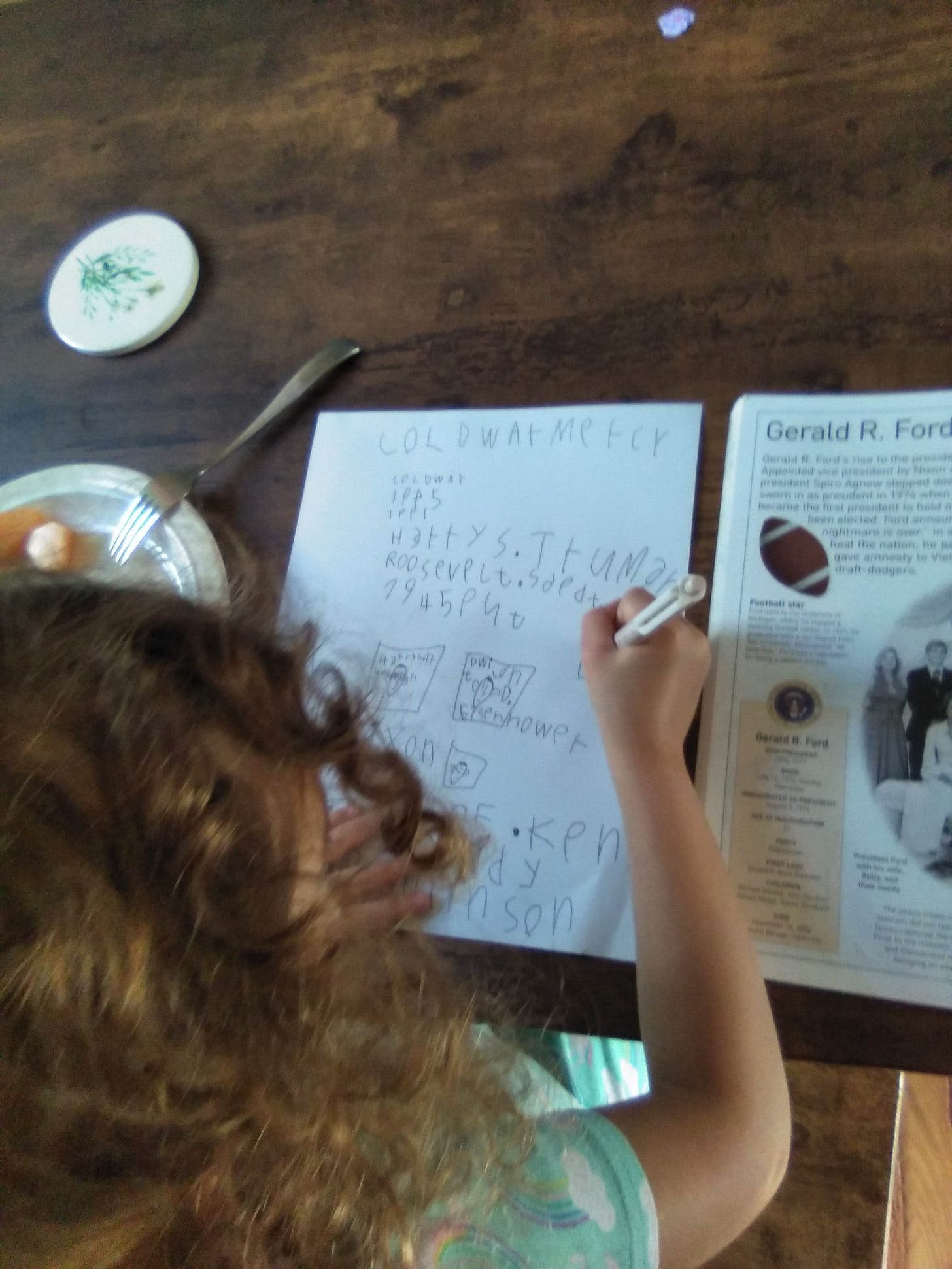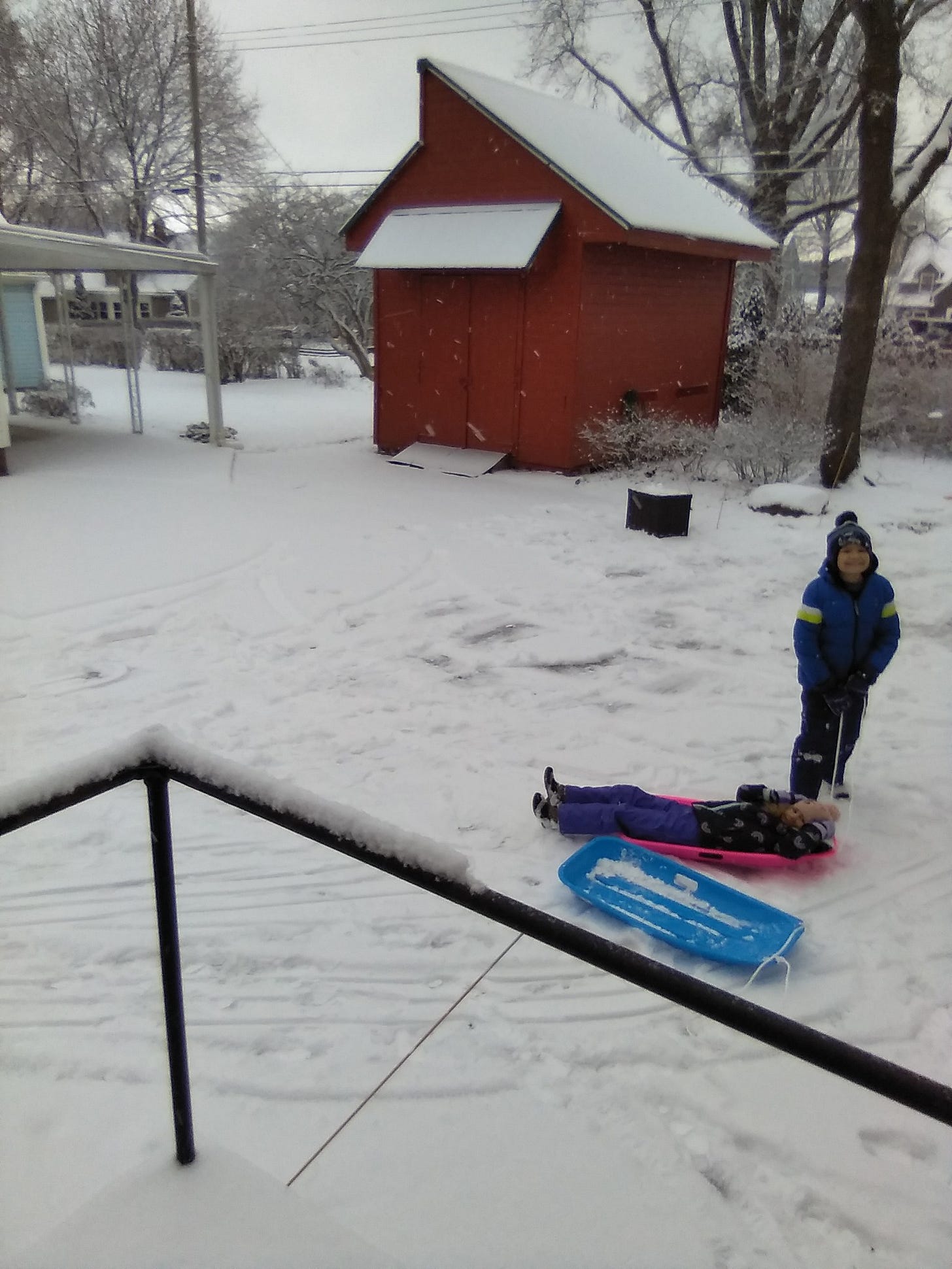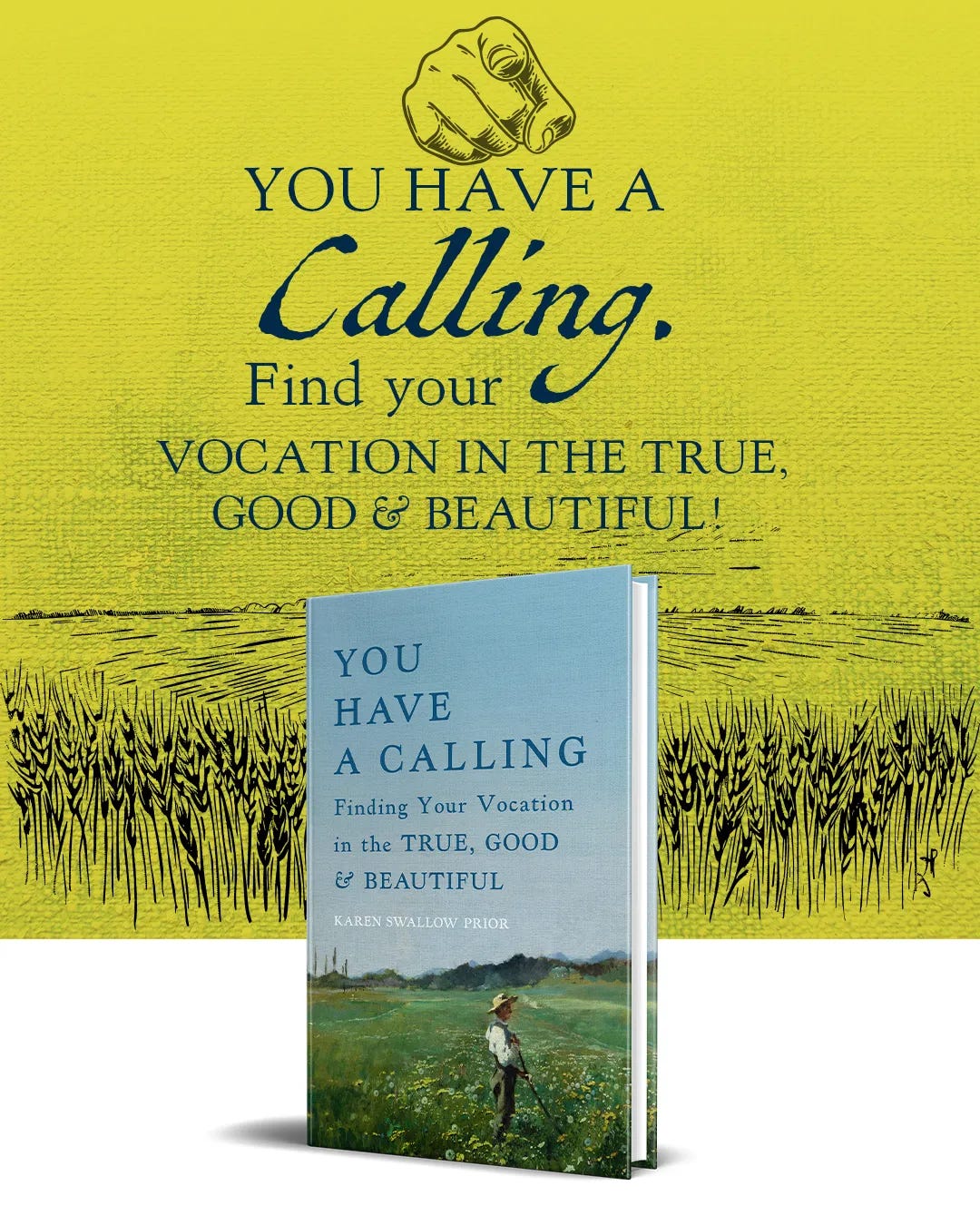Today is the official release day for You Have a Calling: Finding Your Vocation in the Good, True, and Beautiful! I know some booksellers have sent out copies early, and it’s been fun to see readers share their images of the new book. Keep them coming!
To celebrate, I’m running a series of interviews with a few folks on their own callings.
I begin with
, with whom I’ve had the pleasure of sharing online spaces here and there and finally, in-person space at the Conference on Faith and History. Here is Nadya on her callings:
Tell us a bit about yourself in a few sentences.
I was born in Russia and grew up there and in Israel before moving to the US in high school. I always loved languages and reading, so when I heard in late high school that one could actually make a career of it all, I was pumped. I declared my major in Classics the day before my freshman year of college began, then added a second major in French literature, just so I could read a French novel a week and get college credit for it (it honestly seemed like a total scam, considering how fun it was!). Then I received my PhD in Classics right as I turned 27 and was sure I'd be a lifelong academic, reading Greek for hours on end until retirement or until I went blind, whichever came first. Then the year I turned 30, there was much upheaval in my life, and the unexpected result of it was that I came to Christ. It was a surprise and shifted my thinking gradually about a number of things--that's still in progress, well over a decade later, I think. Then two years ago I left my tenured job (as full professor, no less) to focus on homeschooling my kids and writing and editing. I'm married to Dan, a fellow nerd, who is staying in academia and has never experienced a real crisis of calling, it appears. His favorite game as a 6-year-old was writing homemade books about American history and politics, and now four decades later he does this in real life... uncanny!

How do you think about calling (or vocation) generally?
It's remarkable how much family influences our thinking about this--as with all things. I grew up in this very practical Russian-Jewish immigrant family. So my parents' view of vocation considered talent and personal inclinations important, but they also valued hard work. There was this ethic in the home that you only do things really well or they're not worth doing. But there was, at the same time, a very narrow list of acceptable professions. Really, just the trinity: engineer, lawyer, doctor.
The pursuit of excellence is one I've retained myself, which makes it difficult to have genuine hobbies, things you might not be good at but just delight in doing just because. But I was also attracted early on to the idyllic and very common dream you tackle so well in your book--the notion that if you find a job you love, you'll never work a day in your life. Of course, it's silly--both in practical terms and from a theological perspective. It took getting very burned out at the job I used to love to recognize this. But also, my parents never talked about calling in any context other than work--which I think is quite typical of stressed out immigrants who want to make sure that their kids really launch in a new country and don't stay forever in their basement. I think it took a few years of living as a Christian for me to start thinking of calling as something that goes far beyond just work and is more relationally oriented. And reading Wendell Berry's reflections on the problems of how people think about work and calling in the modern world was also influential--he has harsh words to say about people who spend a lifetime just counting down to the end of each workday or week. And he is right! God has something so much more beautiful in mind for our lives.
How do you think about calling in your own life?
I am a dreamer who is attracted to beauty and values intellectual depth and honesty. When I walked away from academia two years ago, I wrote: "I have come to realize that my calling is to love people and ideas. In this order. Of course, loving ideas means knowing how to love well the people who hold these ideas, because ideas (and books that grow out of these ideas) do not exist in a vacuum." I still stand by this. What was helpful about articulating this to myself is that it was a flexible vision, open to the unexpected: loving people and ideas can take a variety of forms, some of which may look like paid employment of some sort, and others look like serving my family day-to-day, homeschooling my children, reading books and talking about them with my husband and with friends, and so on.
What are some primary callings you’ve followed over the course of your life?
I am a believer, a wife, a homeschooling mother. I've been an academic, and now I am a writer and editor. Also important: I am a member of the local church and I'm a friend--I take these callings seriously.
Have any of those callings changed, ended, or otherwise shifted?
As an adult convert, I very much felt called by God into a relationship, and it was a very intense year of exploration, reading, reflection. It was a calling I never foresaw or expect until it happened. As I now see every other calling through that one, it's powerful to see how they all connect. I am especially grateful for my calling as a mother, which keeps changing as the kids grow older, and I have always felt strongly called to homeschool, so it's been a gift to be able to do this.
The one calling that changed dramatically—or, perhaps, shifted—relates to my paid work. I was an academic for 15 years, then walked away when my job at the secular state university where I was teaching became untenable. It was, in some ways, a clash of two callings: I could no longer be a Christian and a professor at that institution. So the intellectually honest thing to do was to walk away. But since then, my calling as a writer and editor has since grown from something that was just a small project for joy into a much larger project--still for joy, but it is a paid career now as well. I probably confuse a lot of people whenever I respond to an invitation to write something, when I say, "Oh, this will be so fun!" And I mean it, every time. If I didn't think it would be fun, I wouldn't accept the invitation!
What difficulties have you experienced in finding or fulfilling a calling in your life?
I think any difficulties I've had were really difficulties in finding a job--something that every academic can relate to. I spent all of my school years studying the subjects I loved dearly. And then I did land a tenure-track job in my field, and most of the years in that job, it really was a good job that fulfilled my calling. It's only when it changed that I realized I had to walk away. But in so doing, I was able to shift much more of my time to my calling as a writer and editor.
How has a particular calling surprised you?
I already mentioned that coming to Christ as an adult was a surprise. I really felt God pursuing me, working in my heart and in my life. More recently (and less profound), becoming a writer and editor has been a surprise. I didn't think of myself as a writer until the pandemic, when I started writing an hour a day on a whim--because I felt that I needed that creative release for my sanity. In fact, also during the pandemic, I started playing the piano again a little, after a nearly 30-year hiatus. (I knew I wasn't going to be making sourdough like 95% of the rest of the American population, so I guess I needed to find something else.) But then I started sending out essays to various places, and they were accepted, and then next thing you know, it's all snowballed somehow into a career, where I'm also writing a book a year!
But the newest surprise is coming this academic year, as I just signed the contract for a new professional role: I have accepted the position of Interim Director of the MFA in Creative Writing at Ashland University. I'm not really coming back to academia--this is a staff position rather than faculty. But I am excited to get the chance to build on my connections in the writing and editing world to train the next generation of writers! The program was founded in 2007 by the poet and prolific writer and editor Stephen Haven (whose work I know from Slant Books--who published his most recent collection), although there have been a couple of other directors since. In the age of AI and the crisis of the humanities, working to rebuild a successful MFA program seems a task of civilizational significance. We need writing that is good, true, and beautiful. While I hadn't expected a calling to become an MFA program director, I have long felt the calling to encourage the flourishing of writers and of good writing.
What roles have other people played in helping you discern and follow a calling?
We all thrive on encouragement--that "well done" every now and then. It's such a theological longing, but it's also a practical one. Besides, honest feedback on things we do helps with the discernment piece. I think especially when it comes to writing, hearing feedback from other people has been helpful and confirmed that maybe I really could do this. Also, I never thought I'd be an editor until a much more seasoned writer and editor--Eric Miller, then at Current--invited me to become an editor there. Sometimes other people see the potential for something in us that we'd never see for ourselves. And I try to be that person for others too--telling others if I see that they have the gift for something that perhaps they didn't realize. So much of raising children, teaching at any level, and just being a friend involves being that person for others. Maybe these gifts we identify won't turn out to be a calling for others, but at least they would know about the possibility and can discern for themselves.
***
What’s next:
I will continue this series of interviews with folks on their own callings for a couple of weeks. I hope these conversations encourage you in thinking about your own callings in life.
Come late August or September we will pick up our reading with the English Neoclassical poet Alexander Pope! We will start with An Essay on Man and see what your pleasure is from there, readers. I’m curious if you are familiar with Pope already, and if so if you enjoy him or not. If you don’t know him, I can’t wait to see what you think! Oscar Wilde was not a fan. He famously quipped, “There are two ways of disliking poetry; one way is to dislike it, the other is to read Pope.”
"Absolutely unmixed attention is prayer.” – Simone Weil1
You can order You Have a Calling by clicking the link on the graphic below! And once you’ve read it, please do consider leaving a review where you can. Those really do help get the word out. Thank you so much!
Simone Weil, Gravity and Grace, trans. By Emma Crawford and Mario von der Ruhr (London: Routledge, 2002), 117.




I understand burning out on work you love. Part of me wants to return to community nursing, while another part quivers at the very thought. But I think Berry is wrong about watching the clock. Sometimes, you watch the clock to tell your weary mind and body that you only have a few more hours, a little while longer and then you can rest. Some jobs are difficult physically, mentally, and emotionally, for anyone. Yet someone must do them and somehow endure through the doing.
I have not read Pope, at all - I only know him from some rather well worn quotes, such as his quote about vice:
'Vice is a monster of so frightful mien
As to be hated needs but to be seen;
Yet seen too oft, familiar with her face,
We first endure, then pity, then embrace.'
That was quoted - except 'sin' was substituted for 'vice' - repeatedly during my teen years, used as a warning against the slippery slope of allowing in any kind of worldliness. Not very helpful when one is experiencing religious scrupulousity.
That's a really interesting and insightful interview, thank you so much for it. Nadya's reflections on encouraging others and aiming to be that person are super helpful - British temperaments and culture have far too long shied away from that. John Stott said of Paul in his thanksgiving for others that "if we follow his example, we will avoid both congratulation (which corrupts) and silence (which discourages). Instead, we can affirm and encourage people in the most Christian of all ways: ‘I thank God for you, brother or sister. I thank him for the gifts he has given you, for his grace in your life, for what I see in you of the love and gentleness of Christ.’ This way affirms without flattering, and encourages without puffing up." He was a master with words!
Getting burned-out in the job you love: oh yes, recognise that and its complexities! I'm stepping back from full-time paid ministry in a year's time for exactly that reason. 'Running out of steam' is the slightly gentler phrase I've been using to describe it. It might morph into semi or even full retirement, not sure yet. Lots to work through and not just practically.
YHAC not available in the UK until early September - so do I go for the Kindle version, which is available as we speak?? Ah, decisions, decisions. Also, Pope: a complete unknown for me so that sounds really cool.